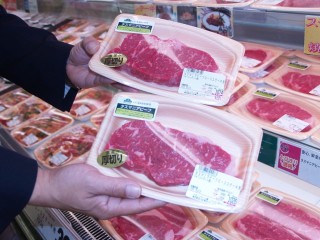 Concern over radioactive contamination in beef has prompted Aeon, owner of Japan’s biggest supermarket chain, to launch its own testing program for cancer-causing substances.
Concern over radioactive contamination in beef has prompted Aeon, owner of Japan’s biggest supermarket chain, to launch its own testing program for cancer-causing substances.
The company will also increase quantities of imported Australian beef produced out of its own Tasmania Feedlot by 30 to 50 percent, in an effort to alleviate local consumer concerns about domestic product.
Aeon announced yesterday that it would sell beef from today in its Tokyo Jusco stores tested by an independent laboratory to be within safe limits for radioactive cesium.
A company statement said Aeon hoped the heightened surveillance would boost confidence in the safety of domestic Japanese beef after agriculture officials revealed that almost 3000 cattle had eaten contaminated feed, potentially leading to tainted meat.
Japanese consumers have since lost their appetite for beef, causing prices to slump, after meat exceeding cesium safety limits was found in supermarkets.
“No matter what it takes and how much it costs, we have to check all the beef to remove consumer fears,” Shohei Murai, an Aeon senior executive, told reporters in Tokyo yesterday.
Topvalu Beef
The tested Wagyu beef products, sold under Aeon’s Topvalu brand will be stocked in 115 supermarkets in and around Tokyo before being made available nationwide, the retailer said.
Topvalu accounts for 60pc of Aeon’s domestic beef products, and the company will ensure its other domestically produced beef is tested after September, said Yasuhide Chikazawa, a corporate officer at Aeon.
Tokyo-based regional manager for Meat & Livestock Australia, Melanie Brock, said the contaminated beef issue had escalated, and it was now a daily news item in Japanese media.
“The ramifications are getting broader as the extent of the contamination and area covered by the meat ban and suspensions grows to include additional prefectures. The event has now taken on additional emotional and political overtones, with issues of compensation arising.”
Mr Brock said it was likely that other Japanese meat companies would now follow Aeon’s lead in initiating private testing. However the Aeon company’s move did not suggest it was lacking in confidence in Government-directed testing work.
“Aeon itself has a strong long-term reputation for ‘going that extra step’ in caring for the health and welfare of its customers, and that applies here, despite the obvious cost involved,” she said.
A large yakiniku restaurant chain this afternoon announced that it, too, will initiate independent testing for contamination, extending such programs from Japanese retail into food service as well.
Nippon Meat Packers, Japan’s biggest meat processor, is also considering measures around beef screening. A company spokesman told Bloomberg that Nippon was asking business partners to test all the beef produced across Japan for cesium, regardless of the region from which it came.
This program had started on July 22, a spokesman for Japan’s biggest retailer and operator of the Ito-Yokado supermarket chain said.
Aeon has contracts with 1500 farmers across the country to supply its Topvalu branded product. Half the farms are in the southern region of Japan’s southern island of Kyushu, more than 1000km from the Fukushima power plant.
Under the retailer’s testing program, 1kg samples will be taken from each carcase and sent to one of five laboratories to confirm the absence of cesium levels exceeding government safety standards.
Aeon aims to double its offering of Topvalu Wagyu products, which it plans to sell in its 1000 outlets by August, according to the company’s statement. It will also increase imports of beef from its company-owned feedlot operations in Tasmania by 30 to 50pc, and sell the products under the Topvalu brand.
A senior company executive told Ms Brock that its recent Australia Fair promotion had been ‘particularly successful’, despite being held during the earliest stages of the contamination crisis before consumer awareness and concern grew.
“Japanese retailers and food service companies have since been inundated with calls from consumer protection groups and individual consumers asking for assurances about what beef they are using,” Ms Brock said.
As the crisis has broadened beyond the immediate area around Tokyo to other areas, there was more evidence of place of origin emerging in domestic beef. Normal descriptors like ‘domestic beef’ had been replaced with words like ‘sourced from southern Kyushu.’
“As customers’ recent concern about place of origin, traceability and iron-clad food safety systems has risen, MLA has fielded a lot of calls from existing customers and other food service and retail operators looking to increase or establish imported beef supplies out of Australia,” Ms Brock said.
The big impediment to that was currency – not only the very weak US$ against the Japanese yen (currently worth about ¥Y77.5), but also the strength of the A$. Despite this competitive disadvantage, there was already strong inquiry for product out of Australia.
